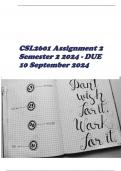[Date]
CSL2601 Assignment 2
Semester 2 2024 - DUE
10 September 2024
QUESTIONS WITH COMPLETE ANSWERS
, CSL2601 Assignment 2 Semester 2 2024 - DUE 10 September 2024
In the early 1990s when South Africa was contemplating transition to democracy,
Wiechers advanced the case for the establishment of a constitutional court. He argued
that this court would be able to protect and enforce human rights and liberties [and] to
provide expert knowledge and the political as well as socio-economic understanding
which is needed to judge intricate constitutional processes and issues.1 This view
echoes the contemporary view that the Constitution2 that was designed to revolutionise
the South African state reflects the needs and interests of all South Africans.3 In its
articulation of a unique form of the separation of powers doctrine4 and in pursuit of
ensuring a modern, robust constitutional democracy, the judiciary has viewed its role as
complementary to (as opposed to distinct from) the legislative and executive branches
of the state. As Corder remarks, in its first 15 years, the Constitutional Court’s
judgments were ‘careful, wide, fair and at time courageous commitment to constitutional
principle and practice’.5 So determined is the judiciary to uphold constitutional principle
and practice that it has recently admonished the executive, with a court declaring that a
particular government department was ‘grossly non-compliant’ and its representatives
had shown up late for the court hearing.6 Some important developments in South
African constitutional law are set out below. First, for the first time in South Africa’s
history, two judges and the Public Protector were impeached. South Africa also has a
multi-party government for the first time since the advent of democracy thirty years ago.
_________________ 1 Marinus Wiechers ‘A constitutional court for South Africa’ in DJ
van Vuuren et al South Africa in the Nineties (1991) HSRC Publisher 290. 2 Constitution




